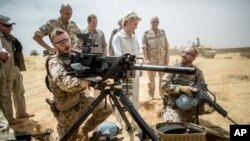The kidnapping of three Red Cross staff and damage to an airstrip by violent protesters in northern Mali have hindered humanitarian operations in a region which has been slowly stabilizing, aid agencies said on Thursday.
The arid region is the focus of a separatist movement and home to Islamist militants, some linked to al-Qaida, who have staged several attacks in Mali and beyond in the past year.
Three International Committee of the Red Cross (ICRC) staff who went missing in northern Mali on Saturday are being held by a community group but are unharmed, the ICRC said.
The ICRC has suspended its operations outside cities in the north, and the damage to the airstrip in the town of Kidal has hampered aid deliveries, said ICRC spokeswoman Claire Kaplun.
Demonstrators on Tuesday broke into airfield buildings run by the United Nations peacekeeping mission (MINUSMA), ransacked them and set fire to the facilities, according to MINUSMA.
"The damage to the airstrip makes life complicated," Kaplun told the Thomson Reuters Foundation. "We now cannot bring aid by plane so need to use the roads, which are dangerous."
Banditry and attacks on aid workers and their vehicles, including car theft and bombs on the roads, are restricting access to several villages in the north, said Muriel Tschopp, Mali country director at the Norwegian Refugee Council.
"Do we reach everywhere where there is need? Certainly not," she said.
Aid agencies have been working with local communities to explain their work and distinguish themselves from MINUSMA forces in order to avoid being targeted, Tschopp added.
'Very fragile'
Armed clashes in the north have subsided since a June peace deal between the government and an alliance of rebels, said the U.N. Office for the Coordination of Humanitarian Affairs (OCHA).
"There has been a slow, gradual stabilization, but the situation remains very fragile," said Ute Kollies, head of OCHA's Mali office. "Some of this progress is regularly compromised by recurring insecurity across the north."
The number of people uprooted by conflict within Mali has halved to 52,000 since May 2015, but 143,000 refugees remain outside the country, mainly in Burkina Faso, Mauritania and Niger, fearing it is still too dangerous to return, OCHA said.
Access to food and water, for both people and their animals which represent their entire livelihood, are the most pressing humanitarian concerns in northern Mali, according to Kollies.
More than 2 million people in Mali do not have enough to eat, and half a million in conflict-hit areas in the north will need urgent food aid during the imminent lean season, she added.
Conflict in Mali erupted in 2012, when a loose coalition of separatist rebels and Islamist militants swept across the north of the country before a French-led military intervention in 2013 drove them from the main towns they had been occupying.
The jihadists have since regrouped, attacking U.N. peacekeepers and French military forces stationed in the north, and launching high-profile raids such as one on a Bamako hotel in November in which 20 people were killed.





